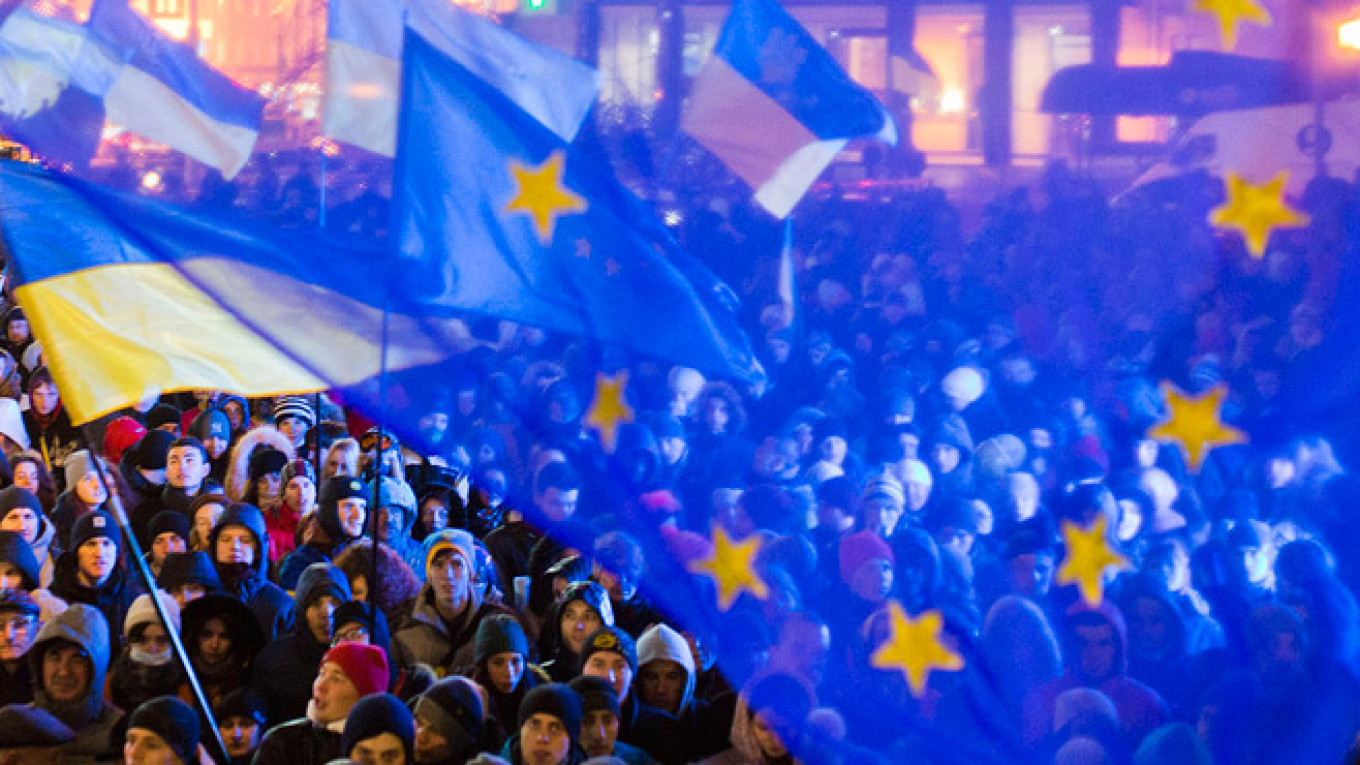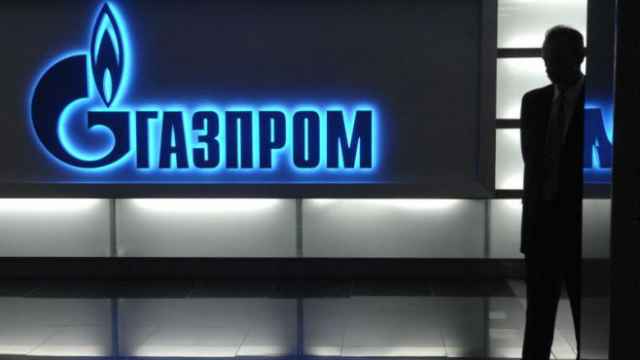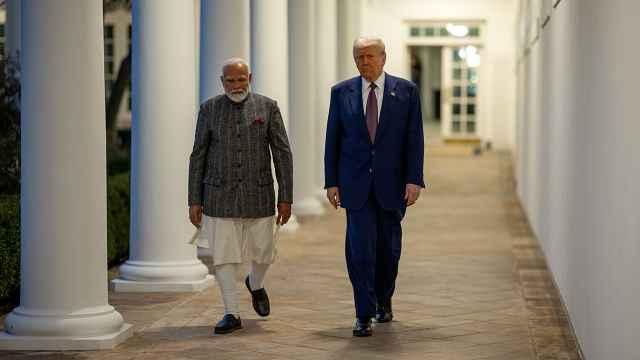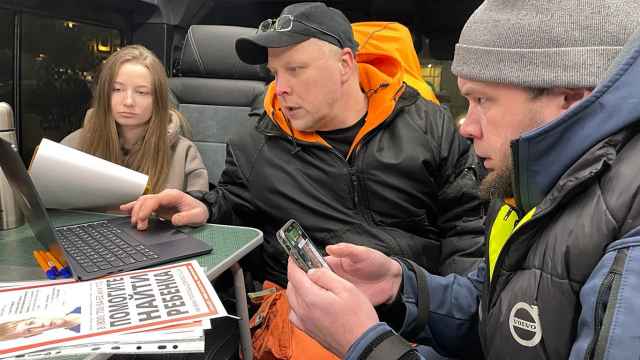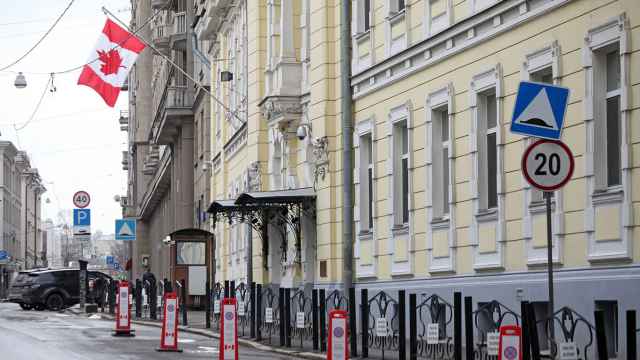BRUSSELS — The EU will offer Russia more time to adjust to a European trade pact with Ukraine, diplomats say, moving to ease bilateral tensions over an accord at the center of the crisis in Ukraine as a ceasefire there takes hold.
Ukraine made an historic shift away from Russia in June by signing a free-trade accord with the European Union, turning its back on its old Soviet master and on a customs union with Russia, Belarus and Kazakhstan. Rows over the pact triggered unrest that toppled Ukraine's Moscow-backed leader in February.
Officials from the EU, which has also delayed implementing new sanctions against Moscow over military involvement in the five-month war in eastern Ukraine, will discuss the pact with Russian and Ukrainian counterparts in Brussels on Friday.
They will seek ways of ensuring Russian companies that export to Ukraine will not be penalized by the higher trade standards that Kiev must adopt once the pact comes into force in November.
"We are proposing a softer route to compliance, so basic requirements are met over a very long horizon," said one EU official close to the talks. "Russia will only need to show that it has the equivalent to EU rules."
It will be the fourth three-way meeting since the accord was signed.
Diplomats say Russian President Vladimir Putin has told EU leaders that a political solution to ending the Ukraine conflict depends on addressing concerns about the trade deal.
He and his Ukrainian counterpart Petro Poroshenko were broadly satisfied with how the ceasefire agreed on Friday between Kiev and pro-Russian forces was holding, a Kremlin adviser said on Wednesday.
NATO No, Trade Deal Maybe
While Russia cannot countenance Ukraine joining the NATO military alliance, Moscow is believed to be willing to accept Ukraine's broad political and trade accord with the European Union under certain conditions, officials say.
U.S. President Barack Obama discussed the economic and trade aspects of the Ukraine crisis with German Chancellor Angela Merkel, British Prime Minister David Cameron and French President Francois Hollande at the NATO summit last week, hours after they met with Poroshenko.
On Friday in Brussels, European Trade Commissioner Karel De Gucht will set out ways to avoid penalizing Russian exporters when he meets Russian Economic Development Minister Alexei Ulyukayev and Ukrainian Foreign Minister Pavlo Klimkin.
"It is not in the EU's interest to hamper in any way Ukraine-Russia trade," De Gucht told reporters following the last three-way meeting, held in Minsk at the end of August.
By their nature, free-trade agreements bring special preferences to the countries involved. One way round that would be for Ukraine to also sign a separate deal with Russia.
"Any time you have a free-trade agreement between two countries, it implies de facto a degree of discrimination towards third parties," said Andre Sapir, a trade specialist at the Brussels-based think tank Bruegel.
"To the extent that those third parties are very closely intertwined, they will feel it more," he said.
Ukrainian companies will receive European technical help and funds to help adapt to EU regulations. But without some kind of agreement with the European Union, Russia would have to put up its own funds to help its companies modernize and comply with EU standards.
The EU-Ukraine pact is due to come into force on Nov. 1 as long as the Ukrainian parliament ratifies it before then.
Gaining unfettered access to the EU and its 500 million consumers offers Ukraine a route to the kind of stability and prosperity that neighboring Poland has achieved.
That could eventually boost Ukraine's economic output by an additional 1 percent a year annually, according to an EU study.
Ukraine, with its mineral resources, large land mass bordering four EU member states and annual output of more than $300 billion is an attractive partner to Moscow and Brussels.
Russia is trying to maintain its influence over Ukraine and other newly-independent states it dominated during the Soviet era, especially those with energy pipelines and large ethnic Russian communities.
A Message from The Moscow Times:
Dear readers,
We are facing unprecedented challenges. Russia's Prosecutor General's Office has designated The Moscow Times as an "undesirable" organization, criminalizing our work and putting our staff at risk of prosecution. This follows our earlier unjust labeling as a "foreign agent."
These actions are direct attempts to silence independent journalism in Russia. The authorities claim our work "discredits the decisions of the Russian leadership." We see things differently: we strive to provide accurate, unbiased reporting on Russia.
We, the journalists of The Moscow Times, refuse to be silenced. But to continue our work, we need your help.
Your support, no matter how small, makes a world of difference. If you can, please support us monthly starting from just $2. It's quick to set up, and every contribution makes a significant impact.
By supporting The Moscow Times, you're defending open, independent journalism in the face of repression. Thank you for standing with us.
Remind me later.


